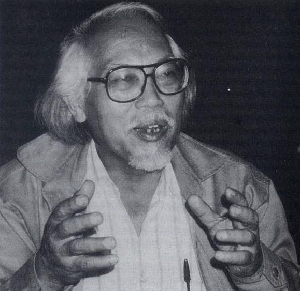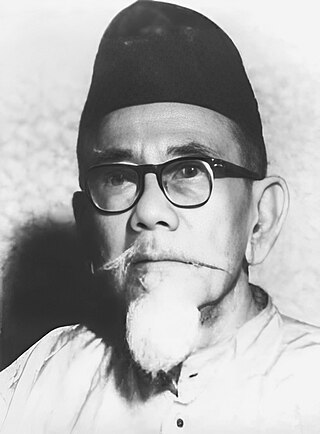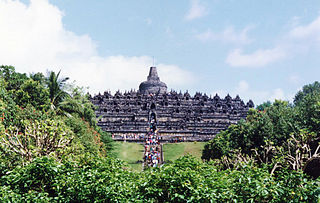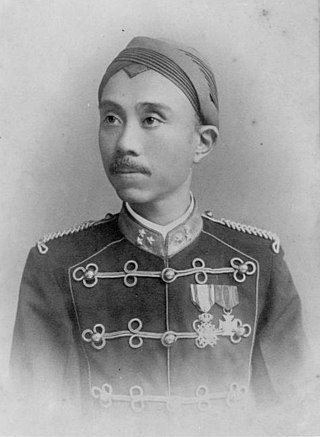
Baduy people are an indigenous Sundanese ethnic group native to the southeastern part of Banten, specifically Lebak Regency, Banten, Indonesia.
Indonesian philosophy is a generic designation for the tradition of abstract speculation held by the people who inhabit the region now known as Indonesia. Indonesian philosophy is expressed in the living languages found in Indonesia and its national language Indonesian, comprising many diverse schools of thought with influences from Eastern and Western origins, and indigenous philosophical themes.
A regency, sometimes incorrectly referred to as a district, is an administrative division of Indonesia, directly under a province and on the same level with city (kota). Regencies are divided into districts.
Many ethnic Chinese people have lived in Indonesia for many centuries. Over time, especially under social and political pressure during the New Order era, most Chinese Indonesians have adopted names that better match the local language.

Yusuf Bilyarta Mangunwijaya, was an Indonesian architect, writer, and Catholic religious leader. He was popularly known as Romo Mangun.

HajiAgus Salim was an Indonesian journalist, diplomat, and statesman. He served as Indonesia's Minister of Foreign Affairs between 1947 and 1949.

Indonesian literature is a term grouping various genres of South-East Asian literature.

Sunda Wiwitan is a folk religion and ancient beliefs adhered to by the Sundanese in Indonesia.

Afrizal Malna, is an Indonesian activist, writer of prose, poetry, and theatrical texts.

Armijn Pane, also known as Adinata, A. Soul, Empe, A. Mada, A. Banner, and Kartono, was an Indonesian author.

Toeti Heraty was an Indonesian poet. She has been singled out as the "only woman amongst the leading contemporary Indonesian poets".

Mangkunegara VI was the prince of Mangkunegaran from 1896 to 1916.

Poedjangga Baroe was an Indonesian avant-garde literary magazine published from July 1933 to February 1942. It was founded by Armijn Pane, Amir Hamzah, and Sutan Takdir Alisjahbana.

Semar Gugat is a stage play written by Nano Riantiarno for his troupe Teater Koma. It follows the traditional wayang character Semar as he attempts— and fails— to take revenge against Arjuna and Srikandi for humiliating him by cutting off a lock of his hair while they are under the influence of the demon queen Durga. Completed in mid-1995, the play consists of 559 lines of dialogue spread through 30 scenes. Semar Gugat has been read as a critique of the New Order government under president Suharto. It was first performed on 25 November 1995 after the government withheld permission for several months. After Teater Koma gave an initial two-week run, it was adapted by various amateur groups. In 1998 Riantiarno won a S.E.A. Write Award for the work.
Darmanto Jatman was an Indonesian poet and writer. He was an Emeritus Professor at the Faculty of Psychology, Diponegoro University (UNDIP), Semarang. He was known as a humanist, philosopher and poet of Indonesia. He gave birth to the establishment of the Faculty of Psychology at UNDIP and became the first professor in the faculty. On 27 July 2007, Susilo Wibowo of UNDIP gave him the title of Professor, exactly a month before he retired, so that he was immediately given the title of Emeritus Professor.

Kawan Bergeloet is a collection of short stories written by Soeman Hs and first published by Balai Pustaka in 1941. It contains twelve stories, seven of which were previously published in the magazine Pandji Poestaka, as well as an introduction by Sutan Takdir Alisjahbana. These stories are generally humorous in nature, and presented with a diction that shows strong east Sumatran influences.

Soeman Hasibuan better known by his pen name Soeman Hs, was an Indonesian author recognized for pioneering detective fiction and short story writing in the country's literature. Born in Bengkalis, Riau, Dutch East Indies, to a family of farmers, Soeman studied to become a teacher and, under the author Mohammad Kasim, a writer. He began working as a Malay-language teacher after completing normal school in 1923, first in Siak Sri Indrapura, Aceh, then in Pasir Pengaraian, Rokan Hulu, Riau. Around this time he began writing, publishing his first novel, Kasih Tak Terlarai, in 1929. In twelve years he published five novels, one short story collection, and thirty-five short stories and poems.

Rocky Gerung is an Indonesian political commentator, philosopher, academic and public intellectual.

Dra. Augustine Magdalena Waworuntu, was an Indonesian politician who became the first post-federal Indonesian mayor of Manado and the first female mayor of Manado.

Minangkabau culture is the culture of the Minangkabau ethnic group in Indonesia, part of the Indonesian culture. This culture is one of the two major cultures in the Indonesian archipelago which is very prominent and influential.















